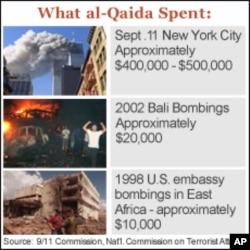The United States continues to fight the war on terror - not with blood, but with zeroes and bytes and bank accounts.
The attacks on New York and Washington in 2001 launched a new kind of war, one waged with surveillance cameras and computer databases.
After 9/11, it became clear the terrorists needed more than ideology to launch their attacks. U.S. intelligence started combing through data - watching travel patterns, electronic communications, and the movement of money.
Fighting financing
Counterterrorism expert Matthew Levitt of the Washington Institute for Near East Policy says, it turns out that fighting the financing of transnational threats is an effective way of disrupting the activities of the enemy.
"If you send me money, that means something," Levitt explains. "It might not mean that you're important or I'm important, but that we are middlemen in something that is more important.”
And Levitt notes that finding the middlemen can lead to finding the major players in terrorist plots.
To do that, the U.S. created a new agency within the Treasury Department. Stuart Levey of the Council on Foreign Relations says it’s the only finance ministry in the world with a full-fledged intelligence office. “But,” he adds, “it reflects an important insight - which is that financial intelligence is highly reliable."
The agency has learned that about a half-million dollars used to carry out the 9/11 attacks was funneled through banks in Europe and the Middle East to the hijackers waiting in the United States.
Terrorism sponsors
The 9/11 Commission found that al-Qaida received most of its cash donations from a network of charities, mosques, websites, Islamic banks and from wealthy donors from the Gulf countries: Saudi Arabia, Kuwait, Qatar and the United Arab Emirates.
Some of that information came from databases owned by a Brussels-based banking consortium.
Using those databases, the U.S. government ordered a freeze on the assets of groups and individuals with known ties to terrorist groups. But the government's ability to tap such financial information provoked concerns about privacy and the potential for abuse.
"People thought we were kind of combing through the information and doing all sorts of just looking at it however we wanted," Levey says. "And in fact, we had put in place very strict controls."
Breakthrough
The biggest breakthrough in the war on terror came this past May, when U.S. commandos killed Osama bin Laden at a private compound in Pakistan. U.S. officials say information seized during the raid confirms al-Qaida is under financial stress.
Prior to 9/11, the CIA estimated al Qaida’s annual operating budget to be about $30 million, raised primarily through donations.
Some terror groups are turning to criminal pursuits - drug smuggling and kidnappings - to fund operations. And as the money dries up, the trend is shifting to smaller, less expensive attacks.
Regardless of the size, Matt Levitt says it pays to follow the money. Even if it’s not a lot of money. "If you need $5,000, but you can't get $5,000 - we win."
As donations dry up, experts say terror groups are increasingly turning to criminal sources such as smuggling, drugs and kidnapping to fund their operations.
It doesn't mean terror attacks will cease. Experts say a multi-pronged approach that stops the flow of money - while confronting an ideology bent on indiscriminate killing - is going to require continued vigilance, commitment and the world's cooperation for years to come.














